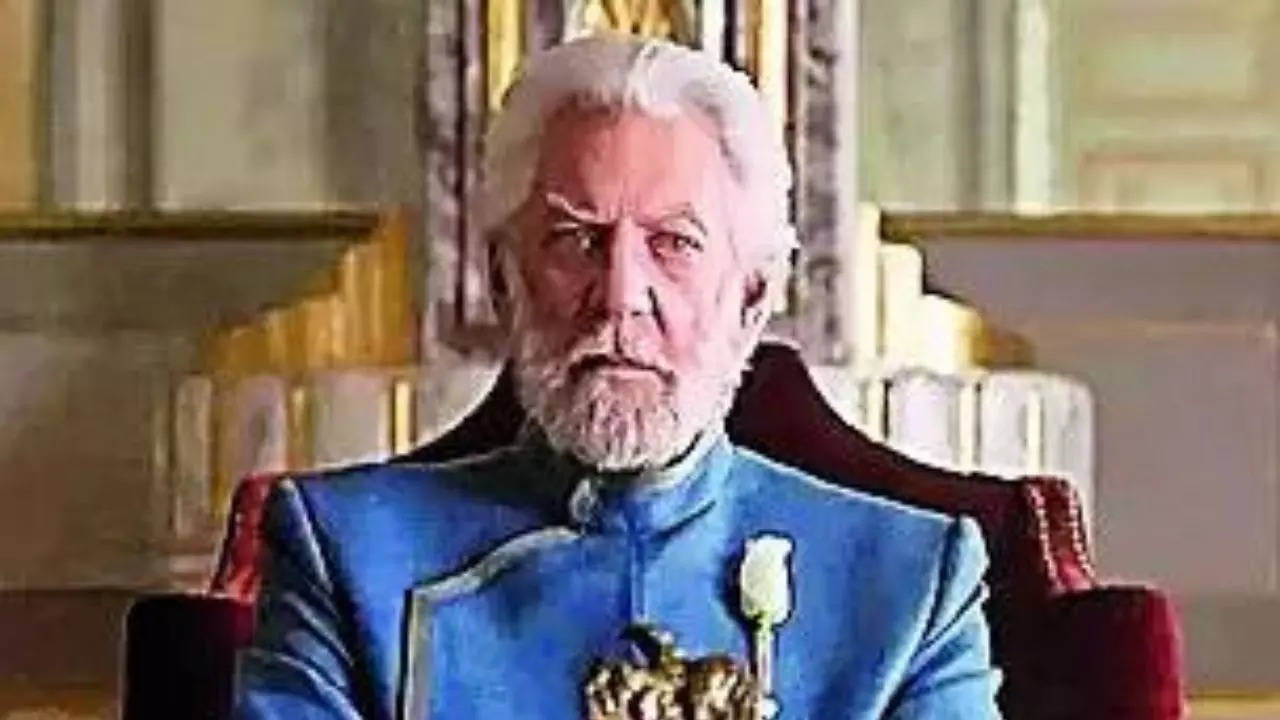Donald Sutherland, whose ability to both charm and unsettle, both reassure and repulse, was amply displayed in scores of film roles as diverse as a laid-back battlefield surgeon in “M*A*S*H”, a ruthless Nazi spy in “Eye of the Needle”, a soulful father in “Ordinary People” and a strutting fascist in “1900”, has died. He was 88. His son Kiefer Sutherland announced the death, but did not specify the cause.
With his long face, droopy eyes, protruding ears and wolfish smile, the 6-foot-4 Sutherland was never anyone’s idea of a movie heartthrob.He often recalled that while growing up in eastern Canada, he once asked his mother if he was good-looking, only to be told, “No, but your face has a lot of character.” He recounted how he was once rejected for a film role by a producer who said: “This part calls for a guy-next-door type. You don’t look like you’ve lived next door to anyone.” And yet across six decades, starting in the early 1960s, he appeared in nearly 200 films and TV shows – some years he was in as many as half a dozen movies. His chameleon-like ability to be endearing in one role, menacing in another and just plain odd in yet a third appealed to directors, among them Federico Fellini, Robert Altman, Bernardo Bertolucci and Oliver Stone. “For me, working with these great guys was like falling in love,” Sutherland said of those filmmakers. “I was their lover, their beloved.”
Sutherland first came to the attention of many moviegoers as one of the army misfits and sociopaths in “The Dirty Dozen” (1967), set during WWII. His character had almost no lines until he was told to take over from another actor. “You with the big ears – you do it!” he recalled the director, Robert Aldrich, yelling at him. “He didn’t even know my name.”
While Sutherland worked almost nonstop to the very end, some of his more memorable roles fell in a stretch from 1970 to 1981, when he appeared in 34 films, often playing men who walked a fine line between sanity and madness – and on occasion erased that line. His fascist in Bertolucci’s “1900” (1976), his heavily made-up Lothario in “Fellini’s Casanova” (1976) and his murderous WWII spy in “Eye of the Needle” (1981) were examples of his capacity for the grotesque and the ominous.
But he could also be winningly irreverent, as in a pivotal early role: Hawkeye Pierce, an insolent mobile-hospital surgeon, in Robert Altman’s “M*A*S*H” (1970), set during the Korean War but with distinctly Vietnam-era sensibilities. Despite the critical acclaim that he usually enjoyed, he never received an Academy Award nomination. There were other honours, though, including a 1995 Emmy for his role as a Soviet investigator in “Citizen X”, an HBO film. He also won two Golden Globes – for “Citizen X” and for his 2002 portrayal of the presidential adviser Clark Clifford in HBO’s “Path to War”. Well-received performances included the kindly Mr. Bennet in “Pride & Prejudice” (2005) the president in the dystopian “Hunger Games” series of the 2010s.
With his long face, droopy eyes, protruding ears and wolfish smile, the 6-foot-4 Sutherland was never anyone’s idea of a movie heartthrob.He often recalled that while growing up in eastern Canada, he once asked his mother if he was good-looking, only to be told, “No, but your face has a lot of character.” He recounted how he was once rejected for a film role by a producer who said: “This part calls for a guy-next-door type. You don’t look like you’ve lived next door to anyone.” And yet across six decades, starting in the early 1960s, he appeared in nearly 200 films and TV shows – some years he was in as many as half a dozen movies. His chameleon-like ability to be endearing in one role, menacing in another and just plain odd in yet a third appealed to directors, among them Federico Fellini, Robert Altman, Bernardo Bertolucci and Oliver Stone. “For me, working with these great guys was like falling in love,” Sutherland said of those filmmakers. “I was their lover, their beloved.”
Sutherland first came to the attention of many moviegoers as one of the army misfits and sociopaths in “The Dirty Dozen” (1967), set during WWII. His character had almost no lines until he was told to take over from another actor. “You with the big ears – you do it!” he recalled the director, Robert Aldrich, yelling at him. “He didn’t even know my name.”
While Sutherland worked almost nonstop to the very end, some of his more memorable roles fell in a stretch from 1970 to 1981, when he appeared in 34 films, often playing men who walked a fine line between sanity and madness – and on occasion erased that line. His fascist in Bertolucci’s “1900” (1976), his heavily made-up Lothario in “Fellini’s Casanova” (1976) and his murderous WWII spy in “Eye of the Needle” (1981) were examples of his capacity for the grotesque and the ominous.
But he could also be winningly irreverent, as in a pivotal early role: Hawkeye Pierce, an insolent mobile-hospital surgeon, in Robert Altman’s “M*A*S*H” (1970), set during the Korean War but with distinctly Vietnam-era sensibilities. Despite the critical acclaim that he usually enjoyed, he never received an Academy Award nomination. There were other honours, though, including a 1995 Emmy for his role as a Soviet investigator in “Citizen X”, an HBO film. He also won two Golden Globes – for “Citizen X” and for his 2002 portrayal of the presidential adviser Clark Clifford in HBO’s “Path to War”. Well-received performances included the kindly Mr. Bennet in “Pride & Prejudice” (2005) the president in the dystopian “Hunger Games” series of the 2010s.






